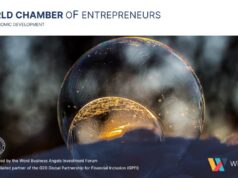The concept of financial inclusion and its role in economic development has been highlighted at recent G20 meetings. Small and medium-sized enterprises have been shown to account for the creation of significant numbers of new jobs and are therefore major contributors to economic growth. Access to finance is clearly an important factor in their development. However, an estimated 2 billion people around the world lack access to an account for even the most basic financial transactions such as making deposits and receiving payments.
The world clearly needs an innovative way to democratise finance, and we maintain that fintech can help expand access to finance and equalise opportunities. Lowering the cost of financial services is one way, but we need to explore ever-increasing innovations in technology areas such as biometric authentication, cryptography, and big data analytics.
As an affiliated partner of the G20 Global Partnership for Financial Inclusion (GPFI), the World Business Angels Investment Forum has taken fintech onto its agenda. The 2019 FinTech Summit of the World Congress of Angel Investors in Istanbul will address the challenges and opportunities of the global fintech ecosystem.
- Increasing the Role of Fintechs for Financial Inclusion: Creating an Innovation Ecosystem to Explore Innovations in Financial Technology for Democratizing Access to Finance Worldwide
- The Impact of Digital Transformation on the Investment Industry: Implications for Angel Investors, Crowdfunders, Private Equity Funds, Corporate Ventures and Wealth and Asset Management Institutions
- Scaling-Up: The Challenge of Fintech Start-Ups
- How Blockchain Drives Innovation in Asset Management
- Cashless Economies: Global Perspectives and Future Trends
- Finding the Best Model for Fintech–Startup Collaboration: Matching the Strategic Vision and Business Goals of Wealth Management Firms and Banks
Increasing the Role of Fintechs for Financial Inclusion: Creating an Innovation Ecosystem to Explore Innovations in Financial Technology for Democratizing Access to Finance Worldwide
Financial inclusion and its role in economic development was highlighted at the G20 meetings in 2017 and again in 2018. Small and medium-sized enterprises have been shown to account for the creation of significant numbers of new jobs, but an estimated 2 billion people around the world lack access to an account for even the most basic financial transactions, such as making deposits and receiving payments. The world clearly needs an innovative way to democratize finance, and we maintain that fintech can help expand access to finance and equalise opportunities. This panel will focus on ways to create an innovation ecosystem that will democratize access to finance globally.
The Impact of Digital Transformation on the Investment Industry: Implications for Angel Investors, Crowdfunders, Private Equity Funds, Corporate Ventures and Wealth and Asset Management Institutions
The digital transformation of corporates is a fact and a necessity, regardless of the industry. The question now is how to execute a digital transformation in the investment industry and what the focus should be. There are many factors that drive technological change and digital transformation, but the most pressing catalysts include customer satisfaction (driven by the fintech generation), social media, competitors using technology as a competitive advantage, exchange rates, demographic factors, geopolitical volatility and, for regulated institutions, the ever-changing regulatory landscape. This panel will focus on how robo-advisors, blockchain, and artificial intelligence will be positioned in the digital transformation process in the investment industry and how the changes will impact angel investors, crowdfunders, private equity funds, corporate ventures and wealth and asset management institutions.
Scaling-Up: The Challenge of Fintech Start-Ups
Fintech companies founded in the last decade offer new products and innovative ideas that may lead to their eventually replacing banks. On paper, they seem better, faster, and more efficient. However, scaling up their initial success remains a significant challenge. Globally, there are over 2,000 fintech start-ups, but only a few have managed to expand their business. They struggle to achieve the so-called tipping point. This panel will focus on the question of how companies can gain market share thanks to fintechs and will address the issue of whether there is a formula that will help overcome the scale-up challenges fintech start-ups face.
How Blockchain Drives Innovation in Asset Management
Blockchain can substantially reduce costs and increase the speed of any digital transaction in the fund value chain by enabling investors and issuers to communicate directly, without any intermediaries. Moreover, since all blockchain transactions are time-stamped, immutable, transparent and auditable, even compliance processes will be simplified. This panel will focus on the impact of blockchain technology on innovation in asset management, considering its potential to completely transform business models in asset management and drastically improve service, along with lower prices.
Finding the Best Model for Fintech–Startup Collaboration: Matching the Strategic Vision and Business Goals of Wealth Management Firms and Banks
In a recent global fintech survey by PwC, the asset and wealth management industry was ranked as the third most likely industry to experience the disruptive impact of start-ups. Futhermore, over half (60%) of asset and wealth managers surveyed believed that at least part of their business is at risk to fintech startups. Clearly, traditional industry players need to explore start-up collaboration as a way to stay relevant, transform offerings, and continuously connect with clients. The collaboration models currently available include the detached model, the overlapping model, and the embedded model. The key to success in fintech collaboration lies in selecting the right model and taking into account critical cultural sensitivities. This panel will focus on ways to select the best fintech–startup collaboration model that fits the strategic vision and business goals of the wealth management firms and banks.
Cashless Economies: Global Perspectives and Future Trends
Digital payments are dominated by debit or credit cards in many European countries, but in other countries (China, for example), consumers have jumped directly from cash to mobile. More than 70% of Chinese internet users say carrying cash is no longer necessary—payments are made via Alipay or WeChat. Few non-Chinese realise how fast and advanced the development actually is in China’s new payment methods and mobile financial services. By contrast, numerous countries are waiting for their ‘uber moment’ to unlock the potential of fintech and wealthtech for a cashless economy. For example, in Turkey, with the world’s 18th largest economy, there are only a few fintech firms. A recent mobile banking survey shows that 34% of individuals in Europe would readily go cashless if given a choice. This panel will focus on how the innovation ecosystem in local economies can come together to create a favourable environment for accelerating the adoption of mobile banking and digital payments and thus make the transition to a cashless economy. The discussants will share their views on the future of cashless economies and best practices from their respective countries.


























